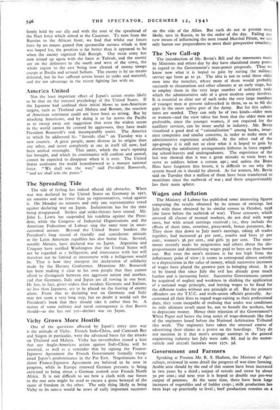The Spreading Tide
The tide of feeling has indeed effaced old obstacles. When war was declared by the United States on Germany in 1917, six senators and no fewer than 5o representatives, voted against it. On Monday no senators and only one representative voted against declaring war on Japan. Isolationism has for the time being disappeared. Strikes and strike-threats have ceased. Mr. John L. Lewis has suspended his vendetta against the Presi- dent, while the Congress of Industrial Organisations and the American Federation of Labour sing the same tune in unac- customed unison. Beyond the United States borders the President's long record of friendly and considerate attitude to the Latin American republics has also borne fruit. Several, notably Mexico, have declared war on Japan. Argentina and Uruguay have notified Washington that the United States will not be regarded as a belligerent, and intercourse with her will therefore not be limited as intercourse with a belligerent would be. That is how they interpret the declaration of solidarity made by the Havana Conference. Meantime Mr. Roosevelt has been making it clear to his own people that they cannot afford to distinguish between one aggressor nation and another, and that Germany, Italy and Japan are all rowing in one boat. He has, in fact, given orders that resident Germans and Italians, no less than Japanese, are to be placed on the footing of enemy aliens. From this to declaring war on Germany and Italy may not seem a very long step, but no doubt it would suit the President's book that they should take it rather than he. A matter of some military and naval consequence is that Russia should—as she has not yet—declare war on Japan.


























 Previous page
Previous page